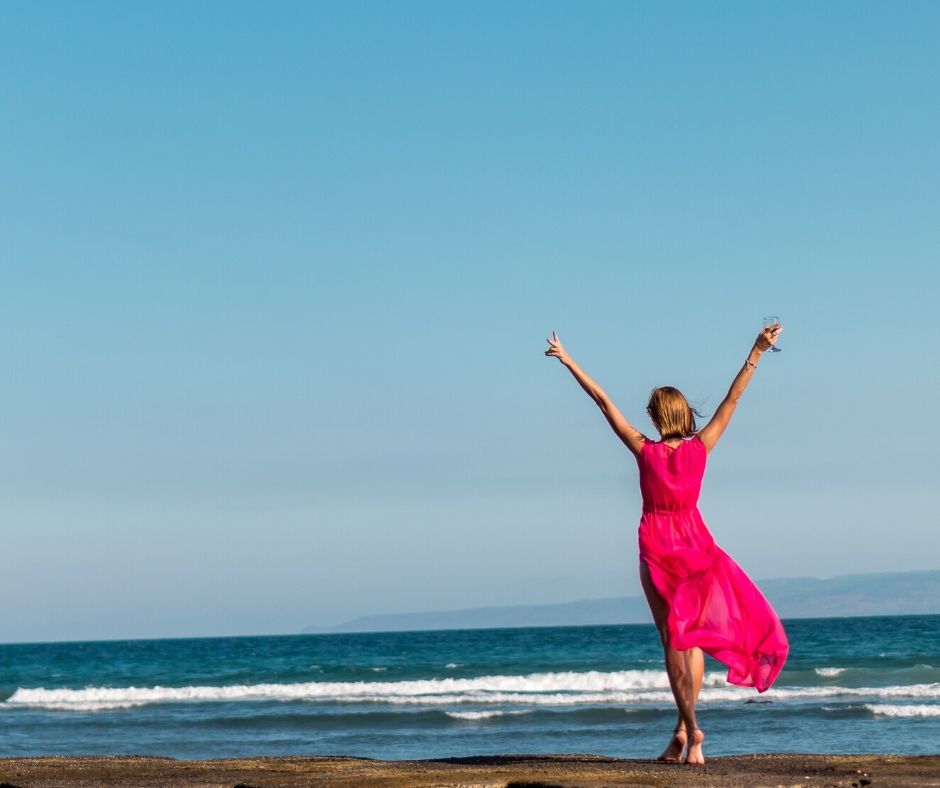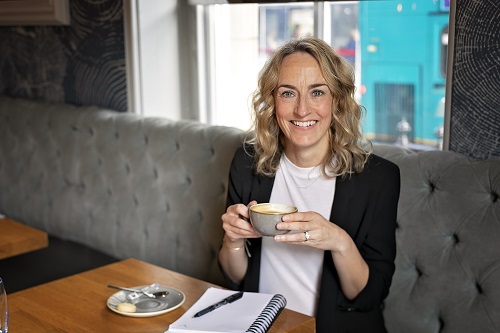
Let me tell you a secret. There’s part of our community that are having a stonkingly good time. The time of their lives maybe.
Yet no one really talks about it or even notices because they are invisible.
If you notice them at all, you’ll see they are smaller than average height, often grey, a bit snitty if intruded upon. Ring any bells? I’m talking post-menopausal here, a greatly feared and reviled time of life because old = decay, old woman = hag, wrinkled = dried up. Right?
A Force Of Transformation
But this is not what I see. The secret is that for those who have chosen to accept the call of menopause as a force of transformation, who have really said a big YES to themselves, their post-menopause can deliver a Second Spring. A vibrancy and relish for life that is comparable to their first spring of their teens and twenties, except without the self-doubt, the lack of confidence and the desire to fit in at all costs.
For the courageous ones, old = freedom, old woman = freedom to choose their own pleasures, wrinkled = the wisdom of discernment
The reason these awesome humans are not visible is because our culture regards older women as somewhat worse than a dose of diarrhea. We can all smell it but we all pretend it’s not there and must never be spoken of.
And yet this need not stop us having the time of our lives. In fact, it probably helps us, because we can do the most outrageous things under the radar.
Seeing the Invisibles
I’ve been interviewing post-menopausal women to try and understand how menopause has changed them. Let me share some inspirational examples so you can see these ‘invisibles’ more clearly.
Go to any Extinction Rebellion march, anti-fracking camp or protest across the world and you’ll see that the largest demographic is made up of twinkly-eyed, post-menopausal women putting their foot down and saying NO! This must end now! These women are taking the role of custodians of the earth and protectors of the rights of the vulnerable.
Vision And Energy
In my own neighbourhood, just outside Watford, where we’re blessed with community events all year round. It took me a while to notice that 80% of them were initiated by post-menopausal women. It is they who have the vision, the energy and the skills to make this stuff happen, and 15 years later, what they initiated is still being enjoyed by the new generation.
Carol (not her real name) found the courage to escape from a damaging marriage and perhaps for the first time in her life, put herself first. She re-trained as a Yoga teacher and is a vision of quiet authority. She says, “I finally feel I belong on the earth, I have found my place”
Saying NO!
For a more ‘out-there’ example check out Viv Albertine, former member of punk band ‘The Slits’. Her memoirs, while not explicitly about menopause, tell the story of how she said NO to the things that did not suit her; a stifling marriage, the shame around her creativity, putting her needs behind those of her partner. She reemerged as a fearless seeker of truth in two of the best books I’ve read in the last decade.
The Best Sex
One woman, now in her 70’s, had never really thought about how menopause had changed her, but happened to mention that she’d left her traditional family life, moving country, to live in her spiritual home in her Second Spring, and also was having the best sex of her life.
Hitting Your Stride
The art world is full of them; Barbara Hepworth, Patty Smith, Georgia O’Keefe, Helen Mirren, all did good work in their 30’s and 40’s but only really hit their stride post-menopause when they seemed to effortlessly up their game. Quite possibly, cultural norms are not so rigid in the artistic world, but even so, it’s clear to see that their work blossomed post-menopause.
Released at last from the need to please the art market, or to not out-shine their partner or husband, from fears about not being enough, they no longer gave a shit about what other people thought about their work. And it started to soar.
The most common thread with these Second Springers is: “I no longer care what people think about me, I am finally free!”
Three Psychological Phases Of Menopause
Menopause is like the ultimate self-help tool. It wants us to become the woman we long to be; authentic, powerful, self-aware and confident. But how do we get there? We all know about night sweats and flagging libidos, but what is not widely understood is that alongside the physical manifestations, menopause is also a psychological process.
Here’s how it works.
Separation
The longest psychological phase is Separation, which is roughly comparable to perimenopause. During this phase we start to feel that we are not ourselves, that something inside us is changing and because most of us are not expecting this to happen, particularly not in our 40’s, it feels like a crisis.
It is in fact a healing. We are being asked to slow down, to cultivate a deep kindness towards ourselves where instead of pushing and pushing through, we tend lovingly to our ragged selves and ask,
“What do I really need here?”
What is actually happening is we are being asked to shed what no longer serves us. The roles we’ve taken on, toxic relationships, the self-sacrifice and the putting other peoples’ needs before our own.
I am not saying it is easy, it can feel awful and women suffer greatly during this time. But attitude changes everything. Where we can greet the challenges with a curiosity, understanding that we’re being asked to heal and transform for the better, the stress, which makes ALL menopause symptoms worse, can melt away.
Your task in Separation is to let go.
Surrender
The next psychological phase is known as Surrender, a wintery phase in which we stop resisting the changes and accept that things are indeed as they are, however bad that feels.
This is where we rest, drop the huge bundles that we lug around with us stuffed with obligation, doing the right thing and over-compensating for not feeling good enough. We finally turn on to ourselves, tune in to our needs and drop out of the world’s demands.
We can slow our pace, do the bare minimum, look busy when the boss is looking, but inside, we are comfortably adrift. We can be kind and mother ourselves as never before.
Your task in Surrender is to rest.
Emergence
Once our tanks are refilling nicely, we’ll start to feel our energy return and this new phase is Emergence. We have been inward focused for a long time and now the energy shifts as we start to look outward into the world again.
You’ll start to have new ideas about work, projects, adventures you might enjoy, it’s like the buds on the trees starting to swell. The trick here is not to rush out and do do do, but to receive the new energy and ideas to nourish yourself.
If you rush out too far and too fast in Emergence, like an early frost on a Magnolia tree, the results can be ugly.
Your task in Emergence is to receive.
Second Spring
Coming out of Emergence we start the beginning of a whole new cycle, the Second Spring. As well as feeling the sheer relief of no longer being subject to the churning process of menopause, it can be quite disorientating landing in Second Spring, a bit like arriving on a strange shore.
It takes time to explore who you are and where your boundaries need to be in this new country. The key themes are to explore without having goals, to be playful with the possibilities that life is presenting to you to use your pleasure as a guide, asking:
“Is this pleasurable for me?”
Your task in Second Spring is to pace yourself.
A Yes To Ourselves
In short, to use menopause as a force for growth. We need to say a big fat NO to the world, and a big fat YES to ourselves. Unfortunately the world is not set up, yet, for us to do this.
There is money to be made out of knackered women in unpaid care work and anti-aging procedures (the profits from the beauty industry are roughly equivalent to the GDP of Angola).
But every yes you can say to yourself, is a small rebellious act to change the way menopause is regarded in our culture.
Ask yourself:
“What would my heart say a big yes to right now?”
Or perhaps…
“What would I love to let go of right now?”
You never know what might happen.
Then next time you’re on the street or in a cafe or on the train, keep an eye out for the Second Springers. They’ll be the ones learning new things, cracking up laughing with their mates, making fabulous art, exploring new avenues and having the time of their lives.
Bio
Kate is a menstrual and menopause mentor, retreat facilitator at Woman Kind and has been a therapist for more than a quarter of a century. She’s been featured in Time Out, The Evening Standard, the London Metro and writes on menopause and women’s health for well-known wellbeing publications and blogs.
She’s in second spring, which means post-menopause, and has deep gratitude for the education that the menopause process has gifted her.
Her mission is to change the way we regard menopause and show women how to relax into their own, inner authority through their cyclical nature and menopause process.








